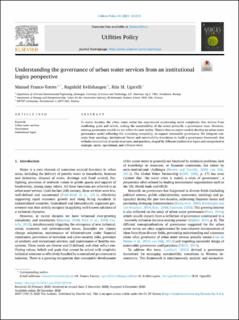| dc.contributor.author | Franco Torres, Manuel | |
| dc.contributor.author | Kvålshaugen, Ragnhild | |
| dc.contributor.author | Ugarelli, Rita Maria | |
| dc.date.accessioned | 2021-01-06T12:30:50Z | |
| dc.date.available | 2021-01-06T12:30:50Z | |
| dc.date.created | 2021-01-03T19:29:51Z | |
| dc.date.issued | 2021 | |
| dc.identifier.citation | Utilities Policy. 2021,68, 101159 | en_US |
| dc.identifier.issn | 0957-1787 | |
| dc.identifier.uri | https://hdl.handle.net/11250/2721723 | |
| dc.description.abstract | In recent decades, the urban water sector has experienced accelerating social complexity that derives from conflicting goals and beliefs, making the sustainability of the sector primarily a governance issue. However, existing governance models do not reflect the new reality. There is thus an urgent need to develop an urban water governance model reflecting this increasing complexity, to support sustainable governance. We integrate concepts from sociology, institutional theory and sustainability transitions to build a governance framework that includes interactions of social structures, and practices, shaped by different institutional logics and categorised at strategic, tactic, operational, and reflexive level. | en_US |
| dc.language.iso | eng | en_US |
| dc.publisher | Elsevier | en_US |
| dc.rights | Navngivelse 4.0 Internasjonal | * |
| dc.rights.uri | http://creativecommons.org/licenses/by/4.0/deed.no | * |
| dc.title | Understanding the governance of urban water services from an institutional logics perspective | en_US |
| dc.type | Journal article | en_US |
| dc.type | Peer reviewed | en_US |
| dc.description.version | publishedVersion | en_US |
| dc.source.volume | 68 | en_US |
| dc.source.journal | Utilities Policy | en_US |
| dc.identifier.doi | 10.1016/j.jup.2020.101159 | |
| dc.identifier.cristin | 1864453 | |
| dc.relation.project | Norges forskningsråd: 257267 | en_US |
| dc.source.articlenumber | 101159 | en_US |
| cristin.ispublished | true | |
| cristin.fulltext | original | |
| cristin.qualitycode | 1 | |

